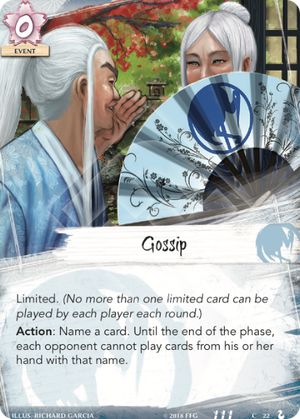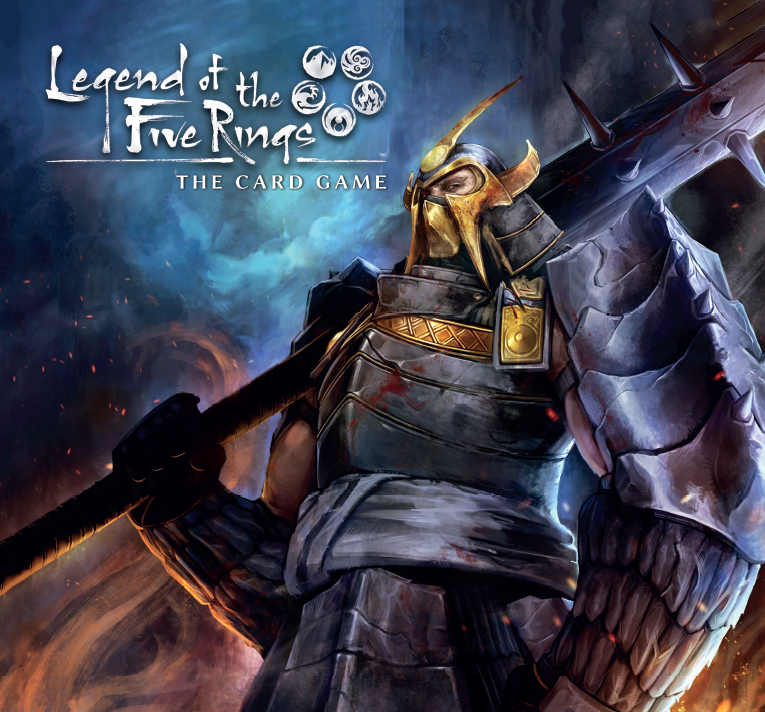As the Legend of the Five Rings LCG continues to mature, a number of abilities mechanics have either been created or evolved from ideas seen during its CCG days. Among these, one of the more notable mechanics is Dueling, which while starting from a place of good intentions has increasingly become divisive in its appreciation. From a thematic vantage, dueling is a pillar of Rokugani culture. Yet its in-game implementation is not nearly as revered. To understand why that is, I would like you to think about it as a mechanic, and as a piece of storytelling.
But above all else, I would like for you to ask yourself a simple question: Are Duels fun?
As someone who has experience as a game design consultant, the first question I always ask any designer is simply, “How is your game supposed to be fun?” We play games for a variety of reasons, but underlying each of these reasons is the pursuit of that purpose. For some, fun takes form in the defeating of an opponent, either systemic (AI in video games, for example) or personal (your opponent). For others, it takes the form of system mastery and elegant design (see the Cardboard Republic 2019 Architect Laurel nominees for examples of those). For others still, it is the thrill of social play, of engaging with other people. Therefore, it’s only fair to ask: at its core, does Dueling in L5R engage any of these audiences, and if so, how?
 The Dueling mechanic itself in L5R admittedly plays to the fun of defeating an opponent. Once you have achieved a game state wherein your opponent is facing you in Conflict with a Character who cannot beat one of your Characters in a duel, you can play as many Duels as you like, automatically winning without any risk while simultaneously punishing your opponent for participating.
The Dueling mechanic itself in L5R admittedly plays to the fun of defeating an opponent. Once you have achieved a game state wherein your opponent is facing you in Conflict with a Character who cannot beat one of your Characters in a duel, you can play as many Duels as you like, automatically winning without any risk while simultaneously punishing your opponent for participating.
The strength of a card like Policy Debate lies not in its Duel effect but in the fact that it can be played multiple times in a single Conflict to look into your opponent’s hand and remove a card of choice. Often, opponents will simply throw a Policy Debate on an otherwise already decided Conflict simply to gain a parity advantage of maintaining card equity (1 card spent for 1 card discarded) as well as a strategic advantage of knowing what is in your opponent’s hand. This has only grown worse with the release of Return the Offense, a 1 Fate Event which makes a player’s most powerful Character available to participate in another Conflict – all this on a 1 Influence Crane Event.
Duels, as they currently resolve in L5R almost never result in anything other than a matched bid between opponents, with the player playing the Duel winning and claiming the benefit. Considering what a Duel could and should be, it’s hard to conclude anything other than that this is a distinct failure of game design.
 When Duels were first previewed way back in 2017, I was instantly hooked by the mechanic of the Honor Bid. While even then I knew everyone would always bid 5 in the Draw Phase until they could not, Duels were the center of my focus on changing Honor Dials. I anticipated eagerly the strategy of building a deck around Dueling, forcing my opponent to try to anticipate my moves, to guess whether or not I was bidding to win a Duel or bidding to lose the Duel but gain Honor.
When Duels were first previewed way back in 2017, I was instantly hooked by the mechanic of the Honor Bid. While even then I knew everyone would always bid 5 in the Draw Phase until they could not, Duels were the center of my focus on changing Honor Dials. I anticipated eagerly the strategy of building a deck around Dueling, forcing my opponent to try to anticipate my moves, to guess whether or not I was bidding to win a Duel or bidding to lose the Duel but gain Honor.
Ultimately, however, the Duels printed in the Core Set were, for the most part, not the sort a person would throw without guaranteeing victory, save for Kakita Kaezin. Indeed, to date Kaezin and Honest Challenger remain the only two Duels wherein victory in the Duel may not be better than loss.
Fast forward to 2020, and Duels have developed into one of the more frustratingly boring parts of the game. They seldom result in the exchange of Honor, they seldom come at any risk, and all they effectively do is serve to punish a player for choosing to have a Character participate in a Conflict – a sin I find to be the most egregious.
 In 2019, I played the Mirumoto Daisho Dishonor Dueling deck extensively, and for a brief moment, I got to see the possibility of just what Dueling could have been. Dueling was suddenly an almost viable strategy towards Honor gains or losses, and they would create states where bid dials were now suddenly different, unlocking both Composure as a keyword and other Honor Dial and Honor Bid manipulation effects.
In 2019, I played the Mirumoto Daisho Dishonor Dueling deck extensively, and for a brief moment, I got to see the possibility of just what Dueling could have been. Dueling was suddenly an almost viable strategy towards Honor gains or losses, and they would create states where bid dials were now suddenly different, unlocking both Composure as a keyword and other Honor Dial and Honor Bid manipulation effects.
I will admit that the Daisho Dueling deck was an unfun archetype to play against, but it was not because of the aspects that I enjoyed. Rather, it was because it favored an uninteractive path to victory, where the player with the Daisho was encouraged to just dishonor bomb their opponent through spamming Duels.
After the banning of Mirumoto Daisho, I convinced myself that Dueling would never become what I wanted to see in the LCG. Yet when Tyler Parrott released the initial form of the Skirmish format, I believed I was being proven wrong. For one of the major changes it made was in how Dueling would resolve. In Skirmish L5R, it replaces the mechanic of Skill + Honor Bid to determine victory with a straight Honor Bid, with the higher Skill before the Duel gaining only a +1 to their final score.
 Suddenly, Duels went from guaranteed victories without any risk to a calculable but existent risk with Honor actually likely to exchange hands. While only 2 Honor at most would ever be risked in a Skirmish Duel, the chance that lower bidding, higher skilled Character could lose a Duel suddenly made all the difference. Duels were no longer solved equations. They now possessed an element of uncertainty that highlighted an ability to predict my opponent’s choices. Duels were no longer safe.
Suddenly, Duels went from guaranteed victories without any risk to a calculable but existent risk with Honor actually likely to exchange hands. While only 2 Honor at most would ever be risked in a Skirmish Duel, the chance that lower bidding, higher skilled Character could lose a Duel suddenly made all the difference. Duels were no longer solved equations. They now possessed an element of uncertainty that highlighted an ability to predict my opponent’s choices. Duels were no longer safe.
Duels should never be safe.
One of the criticisms I’ve heard from people claiming to have been playtesters is that Skirmish Dueling on a scale of the standard Dial never saw Duels being played. The chief argument was that although 2 Honor was an acceptable risk, a 4 Honor exchange was not. While this was presented as criticism, to me, it proved the opposite. It was a feature of the system, luck and all. It also served as the single greatest proof that Dueling as it currently functions in Stronghold L5R is a failed mechanic. Dueling should never have been a mechanic which guaranteed advantage without risk. Risk can be fun, adding in a layer of unpredictability – something that L5R desperately needs.
I’ll say that again: L5R needs more risk.
 Changing Dueling in Stronghold to the same form as Skirmish would add a high risk, high reward play choice to the game. The LCG is a game where there is simply not enough genuine elements of chance, and what risks do exists players strive to eliminate as much as possible. The very nature of the game pulls players towards solid, reliable, safe choices.
Changing Dueling in Stronghold to the same form as Skirmish would add a high risk, high reward play choice to the game. The LCG is a game where there is simply not enough genuine elements of chance, and what risks do exists players strive to eliminate as much as possible. The very nature of the game pulls players towards solid, reliable, safe choices.
While in principle this style of gameplay is fine, L5R also needs to be more than smart, safe choices to remain dynamic. Attacking a face-down province is a bad idea because it is a risk…but it might result in a better outcome than the face-up province. Playing a card earlier rather than later is a bad idea because it is a risk…but it might wind up winning a key Conflict. Giving your opponent a choice is a bad idea because it is a risk…but as the card Gossip has proven time and again, your opponent might make the wrong choice.
Making Duels more unpredictable in Stronghold will unquestionably push them into a higher risk, higher reward facet of the game, and it would not be all that surprising to see many players initially avoid them because of the ingrained notion that inviting risk is a mistake. However, given that players largely avoid Duels already due to a lack of worthwhile incentive, why not give them a worthwhile reason to do so?
So to those players, I say this: let us live dangerously; we’ll have a hell of a time.
David Gordon is a regular contributor to the site. A storyteller by trade and avowed tabletop veteran, he also has a long and complicated past with L5R. These are his stories. He can be reached on Twitter.
You can discuss this article and more on our social media!
Photo Credits: Legend of the 5 Rings images by Fantasy Flight Games.

